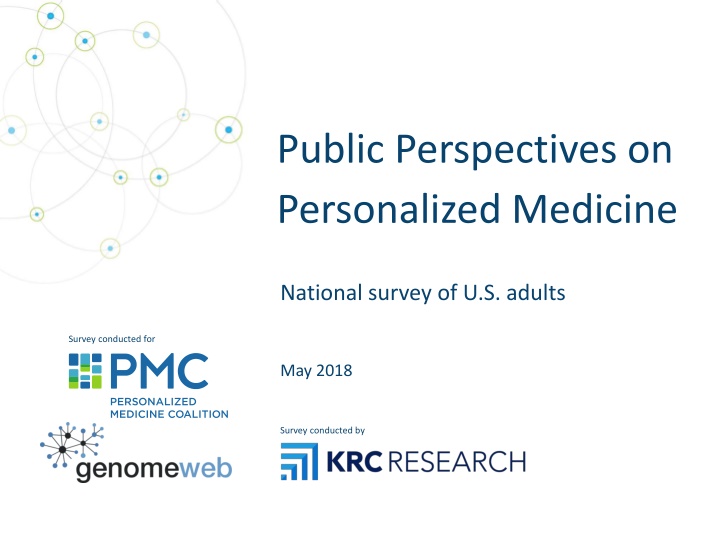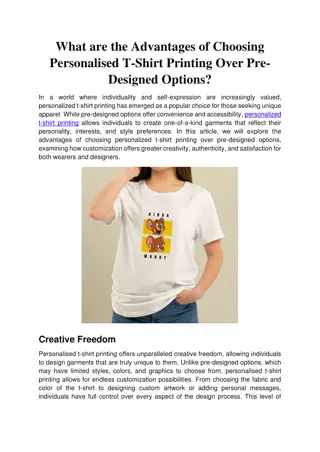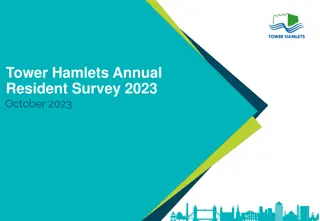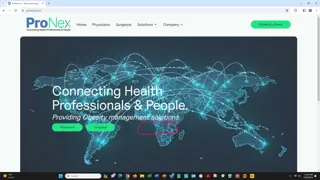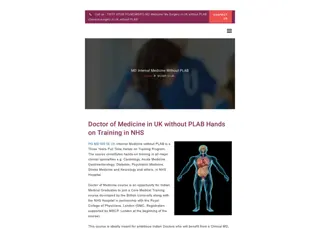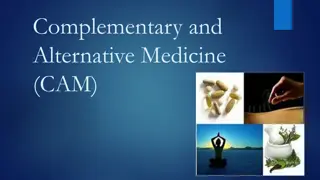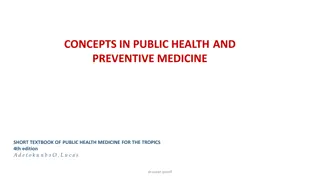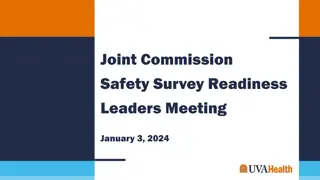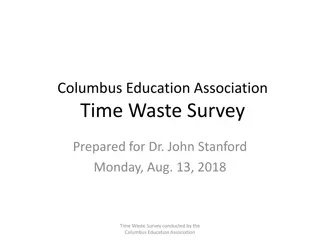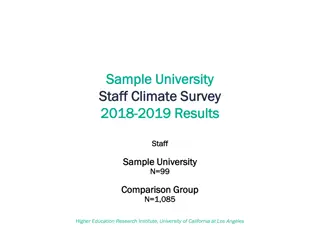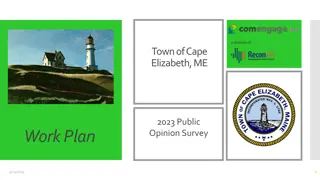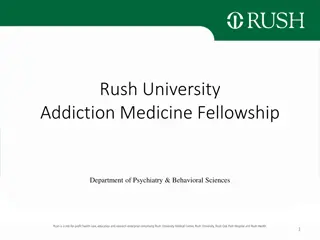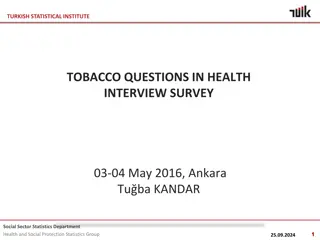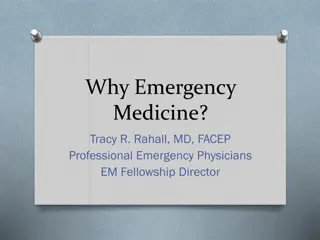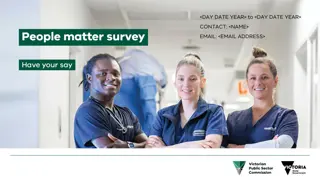Public Perspectives on Personalized Medicine Survey 2018
National survey of U.S. adults conducted in May 2018 to assess awareness, interest, and attitudes towards personalized medicine. Key findings reveal low awareness but increasing interest in personalized medicine among Americans.
Download Presentation

Please find below an Image/Link to download the presentation.
The content on the website is provided AS IS for your information and personal use only. It may not be sold, licensed, or shared on other websites without obtaining consent from the author.If you encounter any issues during the download, it is possible that the publisher has removed the file from their server.
You are allowed to download the files provided on this website for personal or commercial use, subject to the condition that they are used lawfully. All files are the property of their respective owners.
The content on the website is provided AS IS for your information and personal use only. It may not be sold, licensed, or shared on other websites without obtaining consent from the author.
E N D
Presentation Transcript
Public Perspectives on Personalized Medicine National survey of U.S. adults Survey conducted for May 2018 Survey conducted by
Table of Contents Background 3 Objectives and Methodology 4 Executive Summary 5 Key Findings 6 Detailed Findings 10 Awareness of and Interest in Personalized Medicine 11 Excitement and Worry around Personalized Medicine 24 Experiences with and Perceptions of Genetic Testing 35 Attitudes around Genetic Testing Public Policies 43 Appendix 47 2
BACKGROUND Objectives and Methodology
Research Objectives and Method While personalized medicine s potential is well-recognized by many medical experts, a survey commissioned by PMC in 2014 showed limited public awareness of the field. Since then, the U.S. government has made personalized medicine a national priority through its All of Us Research Program. Objectives Method KRC Research conducted a 20-minute national survey of 1,001 U.S. adults 18 years and older. The survey was administered online from February 23 to March 2, 2018. The sample for the survey was randomly drawn from a large national Survey Sampling panel of U.S. adults. KRC established demographic quotas (region, sex, age, education, and race/ethnicity) and weighted data to ensure the sample is demographically representative of the U.S. population based on Census data. The survey objectives were to: Gauge public awareness of and familiarity with personalized and precision medicine and related topics; Measure public experiences related to personalized medicine in clinical settings; Gauge public interest in and questions about personalized medicine; Measure public receptivity to personalized medicine, including perceived benefits and concerns; and Assess any changes in awareness or attitudes compared to PMC s benchmark research conducted in March 2014. 4
EXECUTIVE SUMMARY Key Findings
Key Findings: Awareness of personalized medicine remains low, but interest is on the rise. Awareness of personalized medicine remains low. - Similarly to 2014, just over a third of Americans have heard of personalized medicine, with just 1 in 4 confirming that a description of personalized medicine aligned with what they heard. - Those who pay close attention to health news and policy are most aware, but even among this group awareness is fewer than half. - Of those who say they are aware, most aren t able to provide many details. The concept of personalized medicine elicits very positive reactions. - After reading a brief description of personalized medicine, two-thirds of Americans have a positive reaction, saying that they can see the benefits it will have to society and to them personally. The remainder are neutral, because they do not know enough to say. Since 2014, interest in personalized medicine has grown dramatically. - Over eight in 10 would like to learn more about personalized medicine, up 13 percentage points since 2014. - How personalized medicine can be used to treat cancer is the number one thing people would like to learn about. 6
Key Findings: Excitement and value outweigh concerns. The possibility of disease prevention and detection excites people most. - Six in 10 say these benefits are very exciting. Reducing trial-and-error medicine is seen as the biggest benefit. - Seven in 10 say this is a major benefit. - Those who have witnessed a life-threatening illness see the most benefit from personalized medicine. Most don t have pre-established concerns about personalized medicine. - Top-of-mind concerns involve questions about safety, side effects, and reliability. When shown potential concerns, the biggest fear is that personalized medicine will not be covered by insurers and people won t be able to afford it. - Those in poor health and/or those who have personal experience with life threatening illnesses are most concerned about coverage. Most believe that insurance companies should cover personalized medicine. - Two-thirds see the value outweighing the cost. This is especially true of those who could benefit from tests and treatments more immediately, or could have in the past. 7
Key Findings: Most do not have personal experience with personalized medicine, but most are willing to use it. Americans are likely to use personalized medicine if their doctor recommends it, but they have questions. - Over 8 in 10 adults would be likely to use personalized medicine for developing a specific treatment plan for a disease they already have, treating a disease informed by a genetic test, or to prevent illness, provided their doctor recommended it. - Adults mostly want to know how personalized medicine works, what side effects there are, if it is effective, and what the costs are. Very few are discussing genetic testing, have ever heard of or spoken to a genetic counselor, or have purchased an at-home DNA test to check for their risk of developing certain diseases. - Only one in 10 say their doctor has talked with them or recommended genetic testing. Those who have gotten a genetic test did so to prevent disease, predict if a specific medicine would help treat a disease, or predict the likelihood of getting a disease. - Only about 1 in 5 have heard of genetic counseling, and of those a quarter have spoken to a genetic counselor. - Even fewer (6%) have purchased an at-home DNA test to check for the risk of disease. 8
Key Findings: When it comes to policy, Americans want more information made available and lower costs. Awareness of the Genetic Information Nondiscrimination Act (GINA) is low, but Americans are likely to feel more comfortable as opposed to less comfortable with genetic testing after learning about it. - More than 8 in 10 are unaware of GINA, but after learning about it, nearly one-third feel more comfortable with genetic testing (only one in 10 feel less comfortable). Additionally, few adults are aware of the All of Us Research Program. - Less than one in 10 are aware of the All of Us Research Program. Most do not want increased out-of-pocket costs or government or insurance company control of who is able to access personalized medicine. - Increased government or insurance company control over who gets covered and who doesn t as well as higher out-of-pocket costs to cover personalized tests are mostly viewed as unacceptable. 9
Most Americans say they follow developments in health, health care, and medicine. Most U.S. adults (73%) say they follow developments in health and medicine. One out of five (21%) follow very closely. Follow health news and latest developments in medicine Very closely 21% 73% Somewhat closely 52% Not too closely 22% Not at all closely 6% 12 Q7. How closely do you follow news about health, health care, and the latest developments in medicine?
Yet, personalized medicine is not yet top-of-mind. Unaided, only 3 people mentioned it. What people have heard about medical advances or tools with potential to positively change health care Advances in treatment of diseases Cancer cures, advances and/or treatment Stem cell research to treat diseases Flu treatment or shots New treatment/new medications/vaccines (non-specific) Disease treatment (non-specific) HIV/AIDS treatments Advances in technology and diagnostics Technology in medicine (non-specific) Artificial intelligence/robots/robot surgery Genetics DNA and genetic testing Personalized medicine (3 people mentioned) Other mentions Advancements in medicine (general) Alternate medicine/eating right/diet Medical marijuana Research is increasing (non-specific) Cost/insurance Affordable health care/lowering the cost of health care Obamacare/elimination of Obamacare Other Possible cures and inroads to curing cancer using targeting therapies. 31% 15% 4% 4% 3% 2% 2% 16% 6% 5% 3% 2% <1% 11% 5% 3% 2% 2% 6% 4% 2% 3% Robotics. The ability to utilize robots to perform medical procedures. I think that stem cell research and gene therapy show the greatest promise and potential to help many, many people. Q8. Thinking about everything you have seen, heard and read lately, what medical advances or tools on the horizon have the most potential to positively change health care? 13
When asked specifically, 1 in 3 said they have heard of either personalized or precision medicine, or both. More have heard the term personalized medicine (29%) than precision medicine (15%). There has been little change in awareness since the previous survey conducted in 2014, when we measured 38% aware.* Heard or Read Something About... Genetic test 61% Genetics 58% Diagnostic test 54% Gene therapy 38% Immunotherapy 38% Personalized medicine 29% Targeted therapy 27% Individualized medicine 24% Heard the term personalized medicine and/or precision medicine: 34% (Net) Biomarkers 23% Gene editing 22% Genomics 17% Whole genome sequencing 16% Precision medicine 15% CAR-T therapy 5% CRISPR 5% None of the above 15% Q9. Which of the following words or terms have you heard or read something about prior to today? Please select all that apply. *NOTE: In 2014, prior to the start of the All of Us Research Program, respondents were only asked about personalized medicine, but not about precision medicine. In 2018, they were asked about both because both terms are now used interchangeably. 14
Among those who have heard about personalized medicine, nearly a third cannot describe it. What have you seen, heard or read about personalized / precision medicine? (unaided question) Individualized treatment Targeted treatment; medicine tailored to treat your specific disease/need Individualized treatment; treating an individual person Genetic treatment/therapies based on your genes/based on genetics Treatment based on lifestyle Can target specific areas of body to prevent disease Other general comments Heard of it; have heard the term (general) Good medicine; better medicine (non-specific) Becoming more popular, on the upward swing/on the increase More effective; it works good Used for cancer treatment; for cancer patients Not sure n=344 38% 16% 15% 10% 1% 1% 28% 16% 4% 3% 3% 2% 34% Advances in determining what the gene markers in DNA mean for health issues allows for individualized treatments possibly even down to resolving issues before they occur. An emerging approach for disease treatment and prevention that takes into account individual variability in genes, environment, and lifestyle for each person and differs from person to person according to their particular requirements and pre existing conditions. Q10. [IF HEARD OR READ SOMETHING ABOUT PERSONALIZED OR PRECISION MEDICINE] What have you seen, heard or read about personalized medicine, sometimes referred to as precision medicine? 15
When those who heard of personalized medicine are shown a description, 3 in 4 confirm it is what they thought. Therefore, about 1 in 4 confirm they have heard about personalized medicine. Does this description match with what you thought personalized or precision medicine was, or is this something different from what you had in mind? Personalized medicine, sometimes referred to as precision medicine, is an emerging field that uses diagnostic tools to identify specific biological markers, often genetic, to help determine which medical treatments and procedures will be best for each patient. By combining this information with an individual's medical records and circumstances, personalized medicine allows doctors and patients to develop targeted prevention and treatment plans. The goal is to provide the right treatment in the right dose to the right patient at the right time. 6% not sure 26% of total 18% Different 76% matches what I thought n=344 heard of personalized or precision medicine Q11. [IF HEARD OR READ SOMETHING ABOUT PERSONALIZED OR PRECISION MEDICINE] Does this description match with what you thought personalized medicine or precision medicine was, or is this something different from what you had in mind? 16
In fact, only about 10% feel informed about personalized medicine. Most say they do not feel informed. Of all adults, just over half say they don t feel informed about personalized medicine. Those who were familiar with it prior to the survey are more likely to feel somewhat or very informed. This is in line with what was seen in 2014. 5% 13% 16% Total not informed 53% 37% 32% 48% Not informed at all 32% 40% Not too informed Somewhat informed 51% Very informed 63% 38% Total informed 47% 38% 49% 13% 11% 9% All adults Heard of PM (n=344) All adults 2014 17 Q14. How well informed do you feel about personalized medicine?
Two-thirds have a mostly positive reaction when they read the description about personalized medicine. When shown the PMC description of personalized medicine (shown on page 15), most said they felt mostly positive about it. Nearly a third felt neutral, and only 1% felt negative. This reaction is unchanged from 2014.* Reaction to Description of Personalized Medicine 2014 results % 32% neutral 67% mostly positive Mostly positive 65 Neutral 28 Mostly negative 2 1% Don t know/ref. 5 negative Q12. What is your reaction to the description of personalized medicine? * 2014 description was slightly different: Personalized medicine is an emerging field that uses diagnostic tools to identify specific biological markers, often genetic, to help determine which medical treatments and procedures will be best for each patient. By combining this information with an individual s medical records and circumstances, personalized medicine allows doctors and patients to develop targeted prevention and treatment plans. The goal is to provide the right treatment in the right dose to the right patient at the right time. 18
Positive feelings about personalized medicine relate to the appeal of an individualized approach. Reasons for Positive Reactions about Personalized Medicine Personal appeal Positive/feel positive about it/sounds good (general) Helpful/helps people (non-specific) Better treatment/more efficient Advanced treatment/advances in medicine/innovative Makes sense/accurate Individualized treatment Individual approach/determines what is best for individual patient/personalized (non-specific) Everyone is different/bodies react differently Right medication/give patient the exact medicine needed Targeted/targeted treatment Preventing health problems/prevent illness Genetic testing to target problems/genetic testing to find the right treatment 41% 20% 11% 5% 3% 2% 31% 12% 6% 5% 4% 3% 3% This description pinpoints exactly how to treat a specific diagnosis of a patient, leading to more efficient outcomes in less time. I believe it will help by taking out a lot of the guesswork doctors do now. A lot of people have to go back to the doctor repeatedly for new prescriptions until they find one that works. All bodies are different and one person's cure may not work for the next. Q13. What are your reasons for that reaction? Please explain as clearly as possible. 19
Neutral reactions stem from feeling inadequately informed or wanting to know more. A few worry about safety. Reasons for Neutral or Negative Reactions to Personalized Medicine General neutral mentions Don't know enough about it/don't understand it/need more information Might have some flaws/could have some issues/might work for some and not for others Indifferent/don't care either way Not proven/needs to be tested That's how I feel (non-specific) Skeptical/sounds far fetched Personal concerns Not safe/unnatural/don't trust the medical system Expensive/will run up costs Doesn't make sense/confusing 16%* 9% 2% 2% 1% 1% 1% 3% 2% 1% 1% I don't know enough about it to make an informed judgement. It sounds good, but who knows until it is tested. Sounds great but expensive. * Percent based on all responses, not only neutral comments. Q13. What are your reasons for that reaction? Please explain as clearly as possible. 20
Interest in personalized medicine is very highand has grown 13 percentage points since 2014. Over eight in 10 American adults say they are interested in learning more about personalized medicine, up from seven in 10 in 2014. 4% 4% Total 9% not interested 18% 14% DK/ref. 27% 18% Not interested at all 49% 13 point increase Not too interested Total 46% interested 82% 69% Somewhat interested 32% Very interested 23% 2018 2014 21 Q15. How interested are you in learning more about how personalized medicine can be used?
There is interest in learning more about personalized medicine applications across disease states. The most intense interest related to how personalized medicine can be used to treat cancer and prevent diseases. Total interested Learning more about how personalized medicine can be used 90% 67% 23% Treating cancer 4% 3% 3% 88% 60% 28% Preventing diseases/disorders 5% 3% 3% 88% 59% 28% Treating cardiovascular or heart disease 7% 3% 3% 86% 55% 31% Treating inherited disorders/diseases 7% 4% 3% 86% 49% 36% Treating infections 8% 3% 3% 80% 49% 31% Treating psychiatric or neurological disorders 12% 5% 3% Screening parents who may be at risk of passing an inherited disorder/disease to their children 79% 48% 31% 11% 6% 4% Very interested Somewhat interested Not very interested Not interested at all Not sure 22 Q32-38. How interested are you in learning more about how personalized medicine can be used in the following areas?
Interests vary somewhat by gender and age. Women show more intense interest than men in learning about the specific uses of personalized medicine. Those age 65+ are most interested in how it can treat heart disease, whereas those 18- 34 want to learn more about applications related to inherited and psychiatric disorders. Total very interested Age 18-34 Age 35-64 Age 65+ Men Women Treating cancer 67% 64% 69% 68% 65% 70% Preventing diseases/disorders 60% 57% 63% 63% 60% 55% Treating cardiovascular or heart disease 59% 56% 62% 57% 58% 65% Treating inherited disorders/diseases 55% 51% 59% 61% 55% 47% Treating infections 49% 46% 52% 49% 51% 46% Treating psychiatric or neurological disorders 49% 41% 56% 57% 48% 35% Screening parents who may be at risk of passing an inherited disorder/disease to their children 48% 43% 53% 57% 46% 39% * Highlighted cell indicates statistically significant difference between categories. 23 Q32-38. How interested are you in learning more about how personalized medicine can be used in the following areas?
Top-of-mind excitement about personalized medicine centers around individualized treatment and its potential to be more effective than current treatment approaches. What is exciting or beneficial about personalized medicine? Individualized treatment Treatment that would be best suited for me; the right treatment, no trial and error Preventive medicine the ability to prevent, diagnose before onset of disease Genetic testing/testing for specific disease that runs in my family Targeted therapy/targeted treatment Individualized treatment/aimed at the individual Effectiveness More effective and better treatments that work better Better health/healthier, will feel better Cures for diseases Live better, live longer Other All of it everything sounds beneficial (general) Helpful/helps people (non-specific) New approach/new treatment Less side effects/decrease in side effects Affordable health care/lowering the cost of health care Not sure I think it s developing medicine to a new level and serious illnesses would be combatted in a more efficient manner. 31% 14% 9% 6% 3% 3% 17% 7% 5% 3% 3% 14% 6% 3% 3% 1% 1% 40% The fact that it is so specific is great. Doctors can see the root of the problem and fix it immediately with fewer tests. Q22. Is there anything about personalized medicine that you find particularly exciting or beneficial? What and for what reasons do you find that exciting or beneficial? 25
When presented with a list of benefits, the vast majority say that all are exciting and half or more say very exciting. The most intense excitement is around prevention and early detection of disease. Total exciting Excitement around Personalized Medicine Very exciting Somewhat exciting 89% It can help in the prevention of diseases 61% 28% 88% It can help in the early detection of diseases 60% 28% It can help patients avoid taking medications that may cause them side effects 88% 56% 32% It can aid in the development of more effective medicines and treatments 87% 52% 35% It is personalized based on an individual's genetic profile 85% 50% 35% Q23-27. How exciting would you say each of the following things about personalized medicine are to you? 26
The benefits of personalized medicine are clear to mostand most say these are MAJOR benefits. Over two-thirds of respondents say each of the benefits would be major, with helping to avoid the trial-and-error process of finding effective treatments for patients being the most beneficial. Benefits of Personalized Medicine Major benefit Minor benefit No benefit Not sure Personalized medicine could help me avoid the trial-and-error process of finding which of several treatment options will work for me 70% 20% 5% 5% Personalized medicine could result in less invasive procedures 67% 22% 5% 6% Personalized medicine could help reduce or avoid treatment side effects 65% 25% 4% 6% Personalized medicine could shift the emphasis of my care from reaction to prevention of illness 64% 25% 5% 6% Q28-31. For each of the following benefits of personalized medicine, please indicate how much of a benefit it would be to you personally. 27
Those who have faced a life threatening illness themselves or in their family are most likely to see major benefits in avoiding a trial-and-error treatment processand less invasive procedures. Those who ve never dealt with a life threatening illness themselves or in their family are somewhat less likely to see major benefits than those who have. Life Life Total major benefit threatening illness: personally threatening illness: family Neither Personalized medicine could help me avoid the trial-and-error process of finding which of several treatment options will work for me 70% 74% 74% 68% Personalized medicine could result in less invasive procedures 67% 66% 71% 65% Personalized medicine could help reduce or avoid treatment side effects 65% 68% 69% 63% Personalized medicine could shift the emphasis of my care from reaction to prevention of illness 64% 67% 67% 63% 28 Q28-31. For each of the following benefits of personalized medicine, please indicate how much of a benefit it would be to you personally.
Just over 4 in 10 have top-of-mind worries about personalized medicine, but close to 6 in 10 do not. Anything worrisome about personalized medicine? (unaided mentions) 44% have worries 56% no worries Q39. Is there anything about personalized medicine that is worrisome? If so, for what reasons do you find that worrisome? 29
The most common top-of-mind worries focus on safety, side effects, accuracy, and cost. Worries Related to Personalized Medicine (unaided) Safety/side effects Side effects/if there are side effects Safety/is it safe/risks (non-specific) Addiction/addiction if pills are used Effectiveness/accuracy Accuracy/diagnosis could be wrong Effectiveness/will it really work Cost/coverage Cost/how much it costs/might be expensive Coverage/will health insurance pay for it/refusals Privacy Privacy/information kept private/genetic information getting into the wrong hands Other concerns New/untested/not around long enough Don't know enough/don't have enough information (non-specific) All of it/everything is worrisome (general) Playing God/against God s plan/meddling with nature Process/results concerns Terminal diagnosis/finding out about an incurable disease/will impact quality of life How it works/how it's done No worries How reliable is this technology, taking into consideration how new it is. 12% 7% 5% 1% 8% 6% 3% 8% 6% 3% 7% 7% 10% 4% 3% 2% 1% 5% 4% 1% 56% It worries me that maybe it wouldn t work and people would still end up with side effects from medication. It may be more expensive due to so much personalization. 30 Q39. Is there anything about personalized medicine that is worrisome? If so, for what reasons do you find that worrisome?
When presented with a list of specific worries, coverage and cost are top concerns. The most intense concerns are around the test not being covered by insurance and not being able to afford it. Many also worry about denial of coverage. Worries about Personalized Medicine Major concern Minor concern Not a concern Not sure The test might not be covered by my insurer 62% 25% 10% 4% 2014: 69% I might not be able to afford a personalized approach to health care 59% 26% 10% 4% The test could be used to deny coverage for a treatment I want 52% 30% 13% 6% 2014: 55% Information about my risk for developing a disease in the future could be used to deny long-term care or life insurance that I need 51% 30% 14% 5% Q40-43. Here are some reasons some people give for why they worry about personalized medicine. For each one, please indicate how much of a concern it would be for you personally. 31
Those in bad health and/or who have witnessed a life threatening illness are more intensely concerned than others. Health status Life threatening illness Total major concern Excellent/ very good Good Fair/poor Self Family Neither The test might not be covered by my insurer 62% 57% 63% 68% 73% 63% 60% I might not be able to afford a personalized approach to health care 59% 56% 58% 68% 68% 63% 56% The test could be used to deny coverage for a treatment I want 52% 48% 53% 58% 55% 57% 48% Information about my risk for developing a disease in the future could be used to deny long-term care or life insurance that I need 51% 47% 50% 58% 53% 55% 48% Q40-43. Here are some reasons some people give for why they worry about personalized medicine. For each one, please indicate how much of a concern it would be for you personally. 32
In considering a tradeoff between cost and coverage, most believe the value of personalized medicine outweighs the cost. Because personalized tests and treatments are targeted to a small number of patients, they are sometimes more expensive than conventional tests and treatments. With that in mind, read these two statements. Of the two statements, which one is closest to your own personal opinion? 33% insurance should not cover Personalized tests and treatments deliver more value to patients and may help control overall health care spending by avoiding the trial-and-error process currently used to find a treatment that works for each patient. Therefore, health insurance companies should cover these tests and treatments. 67% insurance should cover Personalized medicine is promising, but health care costs are already high and some of these new tests and treatments are too expensive. In order to keep health care affordable, health insurance companies should not cover these personalized tests and treatments. 33
Those more vulnerable to health issues are most likely to believe insurance should cover personalized medicine. Adults 65 years and older and those who have witnessed a life threatening illness feel more strongly that insurance should cover personalized medicine than others. Age Life threatening illness 18-34 35-64 65+ Self Family Neither Total Insurance should cover 67% 63% 66% 78% 71% 73% 64% Insurance should not cover 33% 37% 34% 22% 29% 27% 36% Q51. Because personalized tests and treatments are targeted to a small number of patients, they are sometimes more expensive than conventional tests and treatments. With that in mind, read these two statements. Of the two statements, which one is closest to your own personal opinion? 34
If their doctor recommends it, most people say they are likely to use personalized medicine for preventing and treating disease. Over half say they would be very likely to use a genetic test to guide treatment for a disease they already have. Likelihood to use Personalized Medicine 3% 3% 4% Total not likely 16% 12% 9% 10% 13% 12% Not at all likely 36% 43% Not too likely 43% Somewhat likely Total likely 84% 87% 88% Very likely 52% 45% 41% For use in developing a personalized plan for preventing illness or disease For use in developing a specific treatment plan for a disease you already have A treatment for a disease informed by a genetic test If your doctor recommended Q18. a genetic test for use in developing a personalized plan for preventing illness or disease, how likely would you be to have the test? Q19. a genetic test for use in developing a specific treatment plan for a disease you already have, how likely would you be to have the test? Q20. a treatment for a disease informed by a genetic test, how likely would you be to accept your doctor's recommended treatment? 36
Questions about personalized medicine center around how it works, safety, potential side effects, and how effective it is. Questions about a personalized prevention/treatment plan I want to know how it helps in the long run. And, I want to know how it works. Process/how it works How does it help how it will benefit or affect me? How does it work what will be going on? What treatment? How would a treatment plan work? How is it done what is the procedure? Is it invasive? How long will it take what time frame/length? What are we looking for? What does it show? Safety/side effects What are the side effects are there any after effects? What are the safety/risks are there any dangers? Effectiveness/accuracy Accuracy how accurate is it? Can results be wrong? How effective is it are you sure it works? Other questions Everything I want everything explained (general) Why do I need this why do it? Who sees the results do the results remain private? What are the pros and cons? Cost/coverage Cost how much will it cost? Will insurance/my insurance cover it? 41% 14% 11% 8% 8% 5% 4% 20% 14% 7% 18% 12% 8% 15% 8% 3% 2% 2% 12% 9% 4% The main thing that I would want to know is that it is safe with no bad side effects. How successful is it? What will the cost be? Does insurance cover some of the costs? Q21. If your doctor recommended a genetic test to develop a personalized prevention plan or treatment plan, what questions would you have about it? What would you like to have explained to you about personalized medicine? 37
Only 1 in 10 patients have heard about genetic testing from their doctors most have not. More than 8 in 10 adults say their doctors have not talked about or recommended genetic tests to them in order to diagnose or guide treatment. Has your doctor talked with you about a genetic test? Not sure 5% Yes 10% No 84% 38 Q16. Has your doctor or a medical provider ever talked with you about or recommended a genetic test to diagnose a disease or guide your treatment?
Just over 1 in 10 adultsparticularly young adultssay they have gotten genetic tests for a variety of reasons. While most (62%) Americans have not gotten a genetic test, those who have did so to prevent getting a disease (13%), to predict if a medicine might work for a disease they already have (12%), or to predict the likelihood they will get a specific disease in the future. Younger people (18-34) are significantly more likely than those age 65 or older to take part in genetic testing for any of these reasons. Reasons for a Genetic Test To help you take steps to prevent getting a specific disease in the future 13% To predict whether a specific medicine might work for treating a disease you already have 12% To predict your likelihood of getting a specific disease in the future 12% To predict whether you will experience severe side effects from a particular medication 9% None of the above 62% Not sure 9% Q17. Below is a list of reasons people get personalized medicine tests. Have you personally ever gotten a genetic test for any of these purposes? Please select all that apply. [MULTIPLE RESPONSES ACCEPTED] 39
Most Americans are unfamiliar with genetic counseling, and of those who are familiar, most have not spoken to a genetic counselor. While less than one in five (17%) have heard of genetic counseling, nearly a quarter of those adults who are familiar have spoken to a genetic counselor. Despite so few having heard of genetic counseling, 21% of women (vs. 13% of men) have heard of it. IF heard of genetic counseling (n=172) Familiar with Genetic Counseling Spoken to a Genetic Counselor 1% 10% 17% 24% 76% 73% Yes No Not sure Yes No Not sure Q44. Have you ever heard of genetic counseling? Q45. [ASK IF HEARD OF GENETIC COUNSELING Q44] Have you ever spoken to a genetic counselor? 40
Fewer than 1 in 10 adults say they have purchased an at- home DNA test, but millennials are leading the way. Six percent (6%) of adults have purchased an at-home DNA test to check their risk of developing certain diseases. However, 10% of millennials have purchased an at-home DNA test, the most of any generation. Purchased At-home DNA Test to Check Disease Risk 2% not sure 6% have 92% have not Q46. Have you ever purchased an at-home DNA test to check for your risk of developing certain diseases? 41
Most are willing to pay at least something for genome sequencing particularly Gen X or younger. Seventy percent of adults are willing to pay for genome sequencing, with most willing to pay up to $50 (27%) or $100 (25%). Asians (88%) are significantly more willing to pay than any other group and Gen Xers or younger are more willing than Baby Boomers or older generations. Thanks to recent technological developments, scientists are now capable of sequencing all of a person's DNA. This is called whole genome sequencing. Some of the data from whole genome sequencing can provide information you and your doctor can use to develop personalized treatment and prevention plans, and scientists hope that the rest of the data may tell us more about a person as we learn more about how the human body functions in the future. Willing to Pay for Genome Sequencing Amount willing to pay 27% Up to $50 30% not willing 25% Up to $100 70% 10% Up to $300 willing to pay out of pocket 5% Up to $500 2% Up to $1,000 1% Up to $5,000 Not willing to pay 30% Q47. How much, if anything, would you be willing to pay out of pocket to have your whole genome sequenced today? 42
Knowing about GINA makes one-third of Americans feel more comfortable with genetic testing. While most (84%) adults are unaware of GINA, nearly one-third (31%) are more comfortable with genetic testing because of it. However, 43% say GINA makes no difference in their comfort level. 18-34 year olds, while more likely to say they were aware of GINA than other age groups, were also more likely to say that it made them less comfortable with genetic testing. The Genetic Information Nondiscrimination Act made it illegal for employers or health insurers to ask for genetic test results when making employment or coverage decisions. Comfort with Genetic Testing Knowing about GINA Awareness of GINA 6% not sure 10% aware 84% Not aware 43% 31% 10% 4% More comfortable No difference Less comfortable Not sure Q48. Prior to reading this, were you aware of the Genetic Information Nondiscrimination Act [GINA]? Q49. Does GINA make you more or less comfortable with genetic testing? 44
Most adults are unaware of the All of Us Research Program. Younger adults tend to be the most aware. Only 9% of adults are aware of the All of Us Research Program. 18-34 year olds (14%) are more aware than older counterparts. The All of Us Research Program [formerly the Precision Medicine Initiative] is an effort by the federal government to gather data from at least one million people living in the United States that can be used to accelerate progress in personalized medicine research. Awareness of the All of Us Research Program 10% not sure 9% aware 81% not aware 45 Q50. Prior to reading this, were you aware of the federal government s All of Us Research Program?
Americans want more information and lower costs when it comes to personalized medicine. Americans like the idea of having more information available to doctors and lower out of pocket costs, but find higher out of pocket costs and government control unacceptable. Total acceptable Possible policy outcomes Doctors and patients will have more information available to decide which course of treatment is best for the individual. 52% 36% 88% 4% 1% 6% Patients will spend less in out-of-pocket costs because the right treatment at the right time will help them avoid paying to treat medical problems caused by the side effects and symptoms that remain when a treatment isn't quite 83% 44% 40% 6% 2% 9% The government and insurance companies will decide which personalized medicine treatments are cost-effective on average, and only cover those that meet their standards. 37% 10% 27% 27% 27% 9% Patients will face higher out-of-pocket costs because of higher co-payments for the tests and treatments used in personalized medicine. 32% 9% 23% 30% 31% 7% Completely acceptable Mostly acceptable Mostly unacceptable Completely unacceptable Not sure Q52-55. Here is a list of possible outcomes that might come about as a result of different policy choices related to personalized medicine. For each one, indicate how acceptable that outcome would be for you. 46
Demographics Race/Ethnicity % Gender % White 61 Male 49 Hispanic 18 Female 51 Black/African American 12 Region % Asian 6 Northeast 18 American Indian/Alaska Native 1 Midwest 22 Native Hawaiian or other Pacific Islander - South 37 Other 1 West 23 Political Party % Generation % Democrat 39 Gen Z 8 Republican 35 Millennials 30 Independent 15 Gen X 27 Income % Baby Boomers 32 Less than $45,000 44 Silent/Greatest 4 More than $45,000 50 Education % Not college grad 70 College grad 30 48
KRC Research Team Mark David Richards Senior Vice President Katie Snediker Research Manager Dylan Luper Senior Research Analyst KRC Research 733 10th St. NW 202-230-8767(direct) mrichards@krcresearch.com www.krcresearch.com @krcresearch | #krcfindings KRC Research 909 Third Avenue 212-445-8037 (direct) ksnediker@krcresearch.com www.krcresearch.com @krcresearch | #krcfindings KRC Research 733 10th St. NW 202-585-2909 (direct) dluper@krcresearch.com www.krcresearch.com @krcresearch | #krcfindings Our insight. Your breakthrough. Our insight. Your breakthrough. Our insight. Your breakthrough. 49
